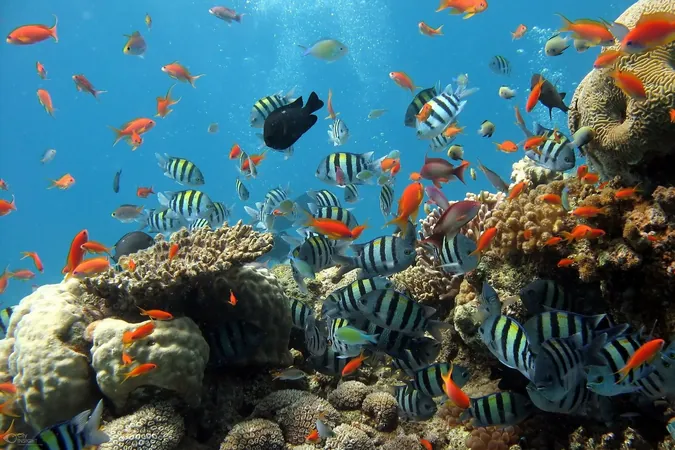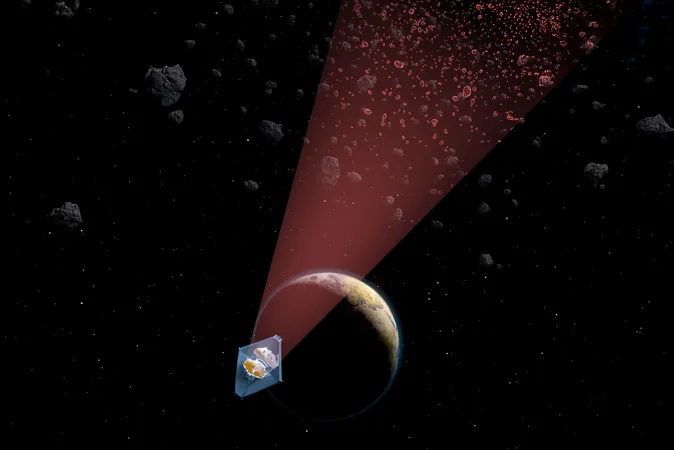
How Artificial Light is Transforming Coral Reef Nightlife into a Predatory Playground
2024-12-18
Author: Li
Introduction
New groundbreaking research reveals that artificial light is dramatically reshaping the communities of coral reefs at night, making them more hazardous for unsuspecting fish. This eye-opening study utilized advanced underwater infrared cameras to reveal the hidden dangers lurking beneath the waves after sunset.
Research Overview
Conducted by an international team from the U.K., France, French Polynesia, and Chile, this pioneering research is the first of its kind to examine the impact of light pollution on coral reef nightlife. Published in the journal Global Change Biology, the findings indicate that oceanic ecosystems are under severe threat from human-induced light.
Expert Insights
Dr. Emma Weschke, a lead author from the University of Bristol's School of Biological Sciences, commented, 'When darkness falls, coral reefs undergo a transformative process. The colorful fish that dance in the daytime retreat to their sleeping spots among the corals, while mysterious nocturnal species emerge looking for their next meal.'
Professor Andy Radford, the study’s senior author, added critical insight: 'The cover of night traditionally protects marine life from predators, but artificial lighting presents a new set of dangers that these creatures are not adapted to handle.'
Methodology and Findings
Utilizing specialized infrared night-vision cameras specifically designed for underwater use, researchers successfully documented the reef's nighttime behavior without influencing the fish. To our surprise, more fish species were found on brightly lit reefs than at sites free from artificial illumination. Many of these weren't typically active at night, indicating that light pollution forces diurnal fish to extend their hours and alters the natural balance of the ecosystem.
'Discovering that artificial light can unsettle the sleep patterns of various fish species is alarming,' stated Dr. Weschke. 'Just like humans, sleep is essential for energy regeneration and overall fitness in marine life.'
Predatory Dynamics
Professor Radford elaborated on the predatory advantages that artificial light affords. 'With the added visibility, predators can easily locate and catch their prey, resulting in an influx of predatory fish to these illuminated areas. It’s a cycle that disrupts the delicate balance of the reef.'
Rapid Changes Observed
The dramatic changes in fish communities were recorded after exposing the reefs to artificial light for an average of 25 consecutive nights, indicating that significant alterations could occur relatively quickly. Alarmingly, just a few nights of exposure were insufficient to exhibit any notable changes.
A Path Forward
However, there is a silver lining. Professor Steve Simpson, another co-author from Bristol's School of Biological Sciences, conveyed encouragement, saying, 'This is good news! It indicates that we have the potential to swiftly and cost-effectively address these impacts. By reducing artificial light, we can help bolster the resilience of these vital coral reefs.'
Conclusions
Dr. Weschke emphasized the importance of recognizing artificial light as an ecological pollutant. 'Unlike greenhouse gases and plastic waste, light pollution doesn’t leave a trace when turned off. By minimizing the intensity and duration of artificial light, focusing it only on essential needs, and reducing its aesthetic application, we can restore the natural darkness that these marine ecosystems have thrived in.'
As the call for action grows louder, the spotlight shines on our responsibility to protect these fragile underwater environments. Could a simple change in our usage of artificial light be the key to saving our coral reefs from a predatory fate? The evidence suggests that every little effort counts!



 Brasil (PT)
Brasil (PT)
 Canada (EN)
Canada (EN)
 Chile (ES)
Chile (ES)
 España (ES)
España (ES)
 France (FR)
France (FR)
 Hong Kong (EN)
Hong Kong (EN)
 Italia (IT)
Italia (IT)
 日本 (JA)
日本 (JA)
 Magyarország (HU)
Magyarország (HU)
 Norge (NO)
Norge (NO)
 Polska (PL)
Polska (PL)
 Schweiz (DE)
Schweiz (DE)
 Singapore (EN)
Singapore (EN)
 Sverige (SV)
Sverige (SV)
 Suomi (FI)
Suomi (FI)
 Türkiye (TR)
Türkiye (TR)